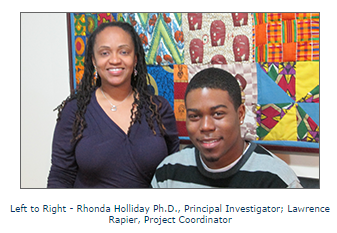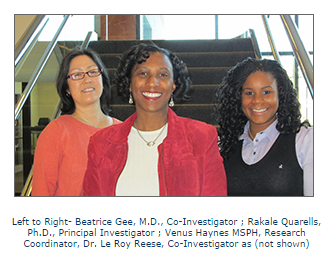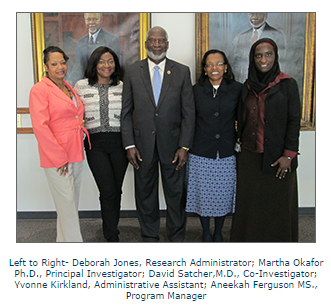Full Research Studies
Research Projects
 The Women’s Health Intervention Study (WHIS)
The Women’s Health Intervention Study (WHIS)
Rhonda Holliday, Ph.D., Principal Investigator
The Women’s Health Intervention Study (WHIS) is an HIV, substance use and mental health
prevention program for incarcerated African American women who are returning home.
The program will also focus on the transition from the correctional facility to the
community. The research study will employ a quasi-experimental design to investigate
the effects of the intervention on risky sexual behaviors, substance use and mental
health, using peer educators to deliver the program. Participants will receive a health education
curriculum while housed at the correctional facility. Upon release, participants will
also receive community booster sessions. All participants will be assessed at baseline,
immediate post intervention, and three and six months post-release. It is expected
that the participants in the intervention group will demonstrate decreased engagement
in risky sexual behaviors and substance use, decreased recidivism and access more
community services. Three hundred and sixty women are expected to be a part of this
study over a five year period. The women will be recruited from two Georgia Department
of Corrections state prisons. To be eligible for the study, the women must be African
American, at least 21 years old, scheduled for release from the correctional facility
within three months, and have a history of sexual activity.
WHIS will interface with the Community Engagement core as well as with the Smart and Secure Parenting Project. WHIS will work with the Community Engagement core to identify and hire the peer educators for the project. Those women who have children ages 5 and younger, and are returning to NPUs V, X, Y, and Z, in the metro Atlanta area, will be informed about the Smart and Secure Parenting Project and provided contact information.
 Rakale Quarells, Ph.D., Principal InvestigatorDeterminants and Consequences of Secondhand Smoke Exposure in African American Children
Rakale Quarells, Ph.D., Principal InvestigatorDeterminants and Consequences of Secondhand Smoke Exposure in African American Children
Exposure to secondhand smoke is a major public health hazard especially among children. It is particularly harmful in this population because of smoking related diseases such as asthma, hypertension, diabetes and cardiovascular disease that develop in childhood.
This project is designed to look specifically at the biological, environmental and behavioral factors influencing secondhand smoke exposure on cardiovascular and lung health in African American children. African American households from NPU’s V, X, Y and Z with a non-smoking child in the age range of 7-15 years. Children who are outside of this age range, self or parent reported smokers, children with Type 1 diabetes*, sickle cell disease, cancer, kidney disease, or chronic debilitating illness resulting in hospitalization in the last year are not eligible to participate. It is hoped that these studies will provide new insights that will guide the development of more effective interventions to reduce racial disparities in smoking-related health problems.
The project will occur in 3 phases over the next 4 years. During Phase I, recruitment, approximately 750 families residing in NPUs V, X, Y, and Z and other counties in Metro Atlanta with a child between the ages of 7-15 years will be contacted to participate in a telephone survey completed by the parent. During Phase II parents that complete the telephone survey will be asked if they would like to participate in measuring the levels of secondhand smoke in one parent and one child by receiving and returning a cotinine kit by mail. During Phase III, parents that return their cotinine kits may then be invited for a clinical assessment (including blood draw) to examine specific biological, environmental, and behavioral effects of secondhand smoke on the health of children.Families will be compensated for their time for returning the cotinine kit and for participating in the clinical assessment.
 Martha Okafor, Ph.D., Principal InvestigatorSmart and Secure Children
Martha Okafor, Ph.D., Principal InvestigatorSmart and Secure Children
The Smart & Secure Children research builds on an existing partnership between the Satcher Health Leadership Institute and community residents, particularly parents, i.e. mothers, fathers, guardians, and grandparents, in developing an acceptable, practical and culturally relevant curriculum to improve quality parenting knowledge and skills. The goal of this research is to develop parents’ mindset, skills, and knowledge of early childhood develop to be effective parents and leaders who can support their peers in parenting smart and secure children. This research will allow us to determine the extent to which our comprehensive quality parenting curriculum, named Smart & Secure Children (SSC), when delivered by parents trained as parent leaders to their peers in a supportive environment, increases child age-appropriate development, school readiness, mental health and well being.
Smart and Secure Children parenting curriculum is a 12 weeks research project, with a real opportunity to help parents focus on their strengths, learn about child development, and set goals with simple practical steps and doable choices that lead to successful parenting of smart and secure children. The objectives of Smart and Secure Children are:
-
- -Increase knowledge of quality parenting
- -Improve the competence and confidence of parents by developing a support network that teaches, learns and practices parenting skills
- -Create learning environments that promote emotional/mental well being of parents through quality of parenting conversations
- -Seventy-five percent of children ages 0-5 of whose parents participate in SSC will meet 4-7 domains of social emotional health(ASQ-SE)

